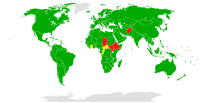Vienna Convention on Consular Relations
|
Parties to the convention Parties Signatories Non-signatories | |
| Drafted | 22 April 1963 |
|---|---|
| Signed | 24 April 1963 |
| Location | Vienna |
| Effective | 19 March 1967 |
| Condition | Ratification by 22 states |
| Signatories | 48 |
| Parties | 179 (as of May 2016)[1] |
| Depositary | UN Secretary-General |
| Citations | 500 U.N.T.S. 95; 23 U.S.T. 3227 |
| Languages | Chinese, English, French, Russian and Spanish[2] |
|
| |
The Vienna Convention on Consular Relations of 1963 is an international treaty that defines a framework for consular relations between independent states. A consul normally operates out of an embassy in another country, and performs two functions: (1) protecting in the host country the interests of their countrymen, and (2) furthering the commercial and economic relations between the two states. While a consul is not a diplomat, they work out of the same premises, and under this treaty they are afforded most of the same privileges, including a variation of diplomatic immunity called consular immunity. The treaty has been ratified by 179 states.[1]
Key provisions
The treaty is an extensive document, containing 79 articles. Following is a basic overview of its key provisions. For a comprehensive enumeration of all articles, consult the original text.[2]
- Article 5. Thirteen functions of a consul are listed, including protecting in the receiving state the interests of the sending state and its nationals, as well as developing the commercial, economic, cultural, and scientific relations between the two states.
- Article 23. The host nation may at any time and for any reason declare a particular member of the consular staff to be persona non grata. The sending state must recall this person within a reasonable period of time, or otherwise this person may lose their consular immunity.
- Article 31. The host nation may not enter the consular premises, and must protect the premises from intrusion or damage.
- Article 35. Freedom of communication between the consul and their home country must be preserved. A consular bag must never be opened. A consular courier must never be detained.
- Article 36. Foreign nationals who are arrested or detained be given notice "without delay" of their right to have their embassy or consulate notified of that arrest. If the detained foreign national so requests, the police must fax that notice to the embassy or consulate, which can then check up on the person. The notice to the consulate can be as simple as a fax, giving the person's name, the place of arrest, and, if possible, something about the reason for the arrest or detention.
State parties to the convention

There are 179 state parties to the convention including most UN member states and UN observer states Holy See and State of Palestine. The signatory states that have not ratified the convention are: Central African Republic, Israel, Ivory Coast and Republic of Congo. The UN member states that have neither signed nor ratified the convention are: Afghanistan, Burundi, Chad, Comoros, Guinea-Bissau, Ethiopia, Palau, San Marino, Solomon Islands, South Sudan, Swaziland and Uganda.
Application of the treaty by the United States
In March 2005, the United States pulled out of the Optional Protocol to the Convention, which allows the International Court of Justice to have compulsory jurisdiction over disputes arising under the Convention. In June 2006, the United States Supreme Court ruled that foreign nationals who were not notified of their right to consular notification and access after an arrest may not use the treaty violation to suppress evidence obtained in police interrogation or belatedly raise legal challenges after trial (Sanchez-Llamas v. Oregon). In March 2008, the Supreme Court further ruled that the decision of the International Court of Justice directing the United States to give "review and reconsideration" to the cases of 51 Mexican convicts on death row[3] was not a binding domestic law and therefore could not be used to overcome state procedural default rules that barred further post-conviction challenges (Medellín v. Texas ).
In 1980, prior to its withdrawal from the Optional Protocol, the U.S. brought a case to the ICJ against Iran in response to the seizure of United States diplomatic offices and personnel by militant revolutionaries.[4]
See also
References
- 1 2 "Vienna Convention on Consular Relations". United Nations Treaty Collection. United Nations. Retrieved 19 May 2016.
- 1 2 "Vienna Convention on Consular Relations" (PDF). United Nations. Retrieved 12 April 2010.
- ↑ the highest international jurisdictions tried to temper the American justice, as evidenced by the judgments of the International Court of Justice 27 June 2001 in LaGrand case (Germany v . United States) and 31 March 2004 in the case Avena and Other Mexican Nationals (Mexico v . United States of America) on the violation of the Vienna Convention of consular relations in trial procedures that led to the capital penalty of foreigners in the USA. The U.S. Supreme Court in Medellin case rejected the interference of international law in the national reserved domain: Buonomo, Giampiero (2007). "Pena di morte: perchè aderire alla moratoria è giusto non soltanto sotto il profilo etico". Diritto&Giustizia edizione online. – via Questia (subscription required)
- ↑ International Court of Justice, 24 May 1980, Case Concerning United States Diplomatic and Consular Staff in Tehran
External links
- Text of the Convention
- Implications of the Vienna Convention on Consular Relations upon the Regulation of Consular Identification Cards
- U.S. Quits Pact Used in Capital Cases: Foes of Death Penalty Cite Access to Envoys – Washington Post article by Charles Lane
- Introductory note by Juan Manuel Gómez Robledo, procedural history note and audiovisual material on the Vienna Convention on Consular Relations in the Historic Archives of the United Nations Audiovisual Library of International Law
- Lecture by Eileen Denza entitled Diplomatic and Consular Law – Topical Issues in the Lecture Series of the United Nations Audiovisual Library of International Law